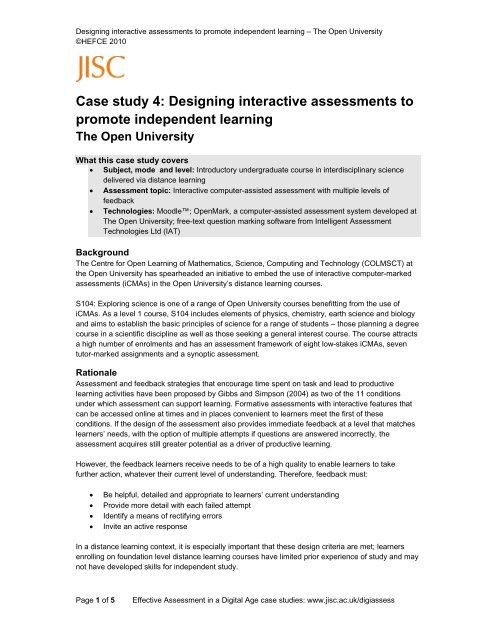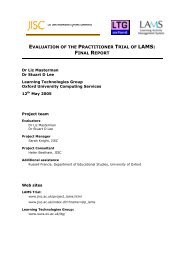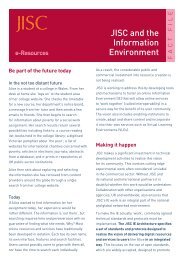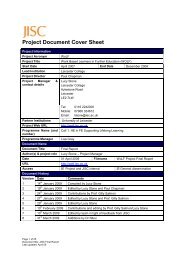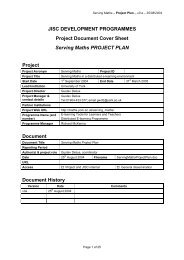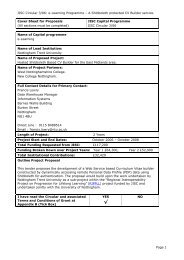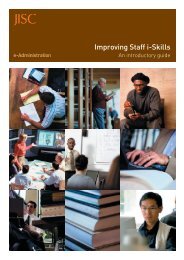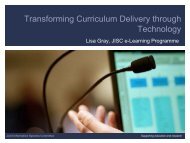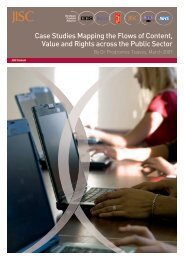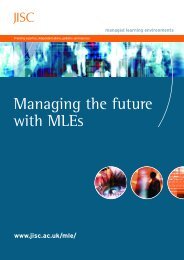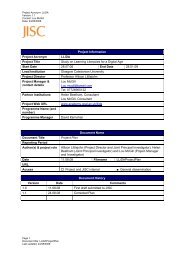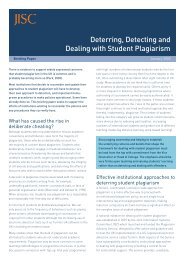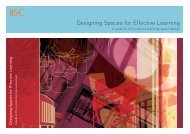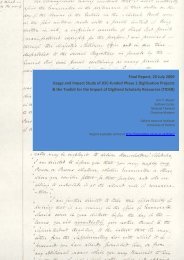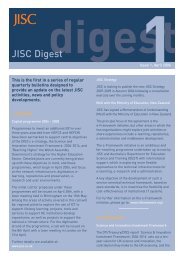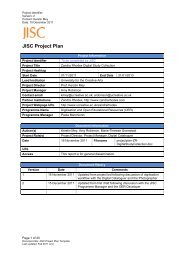Case study 4: Designing interactive assessments to promote ... - Jisc
Case study 4: Designing interactive assessments to promote ... - Jisc
Case study 4: Designing interactive assessments to promote ... - Jisc
Create successful ePaper yourself
Turn your PDF publications into a flip-book with our unique Google optimized e-Paper software.
<strong>Designing</strong> <strong>interactive</strong> <strong>assessments</strong> <strong>to</strong> <strong>promote</strong> independent learning – The Open University<br />
©HEFCE 2010<br />
<strong>Case</strong> <strong>study</strong> 4: <strong>Designing</strong> <strong>interactive</strong> <strong>assessments</strong> <strong>to</strong><br />
<strong>promote</strong> independent learning<br />
The Open University<br />
What this case <strong>study</strong> covers<br />
• Subject, mode and level: Introduc<strong>to</strong>ry undergraduate course in interdisciplinary science<br />
delivered via distance learning<br />
• Assessment <strong>to</strong>pic: Interactive computer-assisted assessment with multiple levels of<br />
feedback<br />
• Technologies: Moodle; OpenMark, a computer-assisted assessment system developed at<br />
The Open University; free-text question marking software from Intelligent Assessment<br />
Technologies Ltd (IAT)<br />
Background<br />
The Centre for Open Learning of Mathematics, Science, Computing and Technology (COLMSCT) at<br />
the Open University has spearheaded an initiative <strong>to</strong> embed the use of <strong>interactive</strong> computer-marked<br />
<strong>assessments</strong> (iCMAs) in the Open University’s distance learning courses.<br />
S104: Exploring science is one of a range of Open University courses benefitting from the use of<br />
iCMAs. As a level 1 course, S104 includes elements of physics, chemistry, earth science and biology<br />
and aims <strong>to</strong> establish the basic principles of science for a range of students – those planning a degree<br />
course in a scientific discipline as well as those seeking a general interest course. The course attracts<br />
a high number of enrolments and has an assessment framework of eight low-stakes iCMAs, seven<br />
tu<strong>to</strong>r-marked assignments and a synoptic assessment.<br />
Rationale<br />
Assessment and feedback strategies that encourage time spent on task and lead <strong>to</strong> productive<br />
learning activities have been proposed by Gibbs and Simpson (2004) as two of the 11 conditions<br />
under which assessment can support learning. Formative <strong>assessments</strong> with <strong>interactive</strong> features that<br />
can be accessed online at times and in places convenient <strong>to</strong> learners meet the first of these<br />
conditions. If the design of the assessment also provides immediate feedback at a level that matches<br />
learners’ needs, with the option of multiple attempts if questions are answered incorrectly, the<br />
assessment acquires still greater potential as a driver of productive learning.<br />
However, the feedback learners receive needs <strong>to</strong> be of a high quality <strong>to</strong> enable learners <strong>to</strong> take<br />
further action, whatever their current level of understanding. Therefore, feedback must:<br />
• Be helpful, detailed and appropriate <strong>to</strong> learners’ current understanding<br />
• Provide more detail with each failed attempt<br />
• Identify a means of rectifying errors<br />
• Invite an active response<br />
In a distance learning context, it is especially important that these design criteria are met; learners<br />
enrolling on foundation level distance learning courses have limited prior experience of <strong>study</strong> and may<br />
not have developed skills for independent <strong>study</strong>.<br />
Page 1 of 5<br />
Effective Assessment in a Digital Age case studies: www.jisc.ac.uk/digiassess
<strong>Designing</strong> <strong>interactive</strong> <strong>assessments</strong> <strong>to</strong> <strong>promote</strong> independent learning – The Open University<br />
©HEFCE 2010<br />
Transforming assessment practice<br />
As a result, the Open University places high value on the interactivity of its learning and assessment<br />
resources and on the immediacy and responsiveness of the feedback that learners receive. The Open<br />
University’s OpenMark assessment system, which supports the development and use of iCMAs<br />
matches students’ answers with predicted responses, assesses whether answers are right or wrong<br />
and then gives appropriate feedback, directing students <strong>to</strong> relevant aspects of their course materials if<br />
an answer is incorrect.<br />
Students receive feedback immediately after each attempt – the timeliness of feedback is crucial <strong>to</strong><br />
successful learning – and both question and answer are visible on one screen <strong>to</strong> allow students <strong>to</strong><br />
make connections between these elements. (A full explanation is given only when a correct response<br />
has been made or when there have been <strong>to</strong>o many incorrect attempts.) Correct responses at the first<br />
attempt score 100%, with lower percentages awarded for correct responses at the second or third<br />
attempt.<br />
To build confidence and lay down skills for effective lifelong learning, question design also ensures<br />
that students work out the answers for themselves using knowledge derived from course materials;<br />
selecting items from a list of uncontextualised multiple-choice options is discouraged. Instead,<br />
students are engaged in an interaction with the question which extends learning rather than merely<br />
checking what the student does or does not know.<br />
iCMAs can also play a diagnostic role. A pre-course test, Are you ready for Level 1 Science? draws<br />
on the bank of questions developed between 2007 and 2008 for S104 and other level 1 science<br />
courses <strong>to</strong> help students establish whether they have the necessary underpinning skills <strong>to</strong> embark on<br />
the S104 course. The approach taken in the test is designed <strong>to</strong> encourage and assist rather than<br />
frustrate learning – students at an early point in their studies need <strong>to</strong> gain experience of working in an<br />
online environment and <strong>to</strong> enjoy the process of learning, but also have <strong>to</strong> test for themselves whether<br />
they are making the right choice.<br />
The development of iCMAs for the S104 course has not diminished the importance of tu<strong>to</strong>r-marked<br />
assignments; online <strong>assessments</strong> complement rather than replace traditional methods of assessment,<br />
producing a mixed assessment strategy in which eight iCMAs, each containing ten questions, operate<br />
in a summative but low-stakes capacity alongside seven tu<strong>to</strong>r-marked assignments. At the end of the<br />
course, a synoptic written assignment is matched with a longer iCMA <strong>to</strong> assess the full breadth of<br />
knowledge that the course covers.<br />
The iCMAs used on S104 are intended primarily as <strong>to</strong>ols for formative assessment. However, data on<br />
students’ use of the iCMAs suggests that they engage more fully if iCMAs carry credits. Therefore, a<br />
low weighting has been applied <strong>to</strong> each iCMa. However, because it is impossible <strong>to</strong> invigilate tests or<br />
authenticate the outcomes as the student’s own unaided work, the iCMAs are low-stakes<br />
<strong>assessments</strong>, typically representing a small proportion of the marks given <strong>to</strong> tu<strong>to</strong>r-marked<br />
assignments.<br />
Page 2 of 5<br />
Effective Assessment in a Digital Age case studies: www.jisc.ac.uk/digiassess
<strong>Designing</strong> <strong>interactive</strong> <strong>assessments</strong> <strong>to</strong> <strong>promote</strong> independent learning – The Open University<br />
©HEFCE 2010<br />
An iCMA question of the type used in S104<br />
Each OpenMark question for the S104 course is produced by an academic member of the course<br />
team, implemented by a media developer and checked by both the academic author and an<br />
experienced consultant. iCMAs designed <strong>to</strong> support more discursive aspects of the course – for<br />
example the question on geology shown above – now support free-text answers of around 20 words<br />
in length. The answer matching for these questions is written by a member of a course team using an<br />
authoring <strong>to</strong>ol developed by Intelligent Assessment Technologies (IAT) integrated in<strong>to</strong> the OpenMark<br />
system. (IAT uses computational linguistics <strong>to</strong> compare student responses against the set of<br />
predicted responses.) In these cases, each student response is sent from the OpenMark server <strong>to</strong> an<br />
IAT server in order <strong>to</strong> verify it and trigger appropriate feedback.<br />
However, trials in 2009 have shown OpenMark’s answer-matching capability in short-answer free-text<br />
questions <strong>to</strong> be on a par with both the IAT system and human markers. As a result, questions<br />
requiring free-text answers that are currently supported by the IAT software will migrate <strong>to</strong> OpenMark<br />
from 2010.<br />
Lessons learnt<br />
Producing <strong>interactive</strong> <strong>assessments</strong> with high-quality feedback is a time-consuming and complex<br />
process for which a sound business case must be made. To function well, questions must support a<br />
range of ability levels and play a confidence-building role while still communicating course<br />
expectations <strong>to</strong> learners. Subject and technical expertise need <strong>to</strong> be combined with question and<br />
feedback authoring skills and each question must be rigorously tested for impact, usability and<br />
accessibility if it is <strong>to</strong> be employed for summative purposes.<br />
Although individual tu<strong>to</strong>rs at the Open University can produce iCMAs (authoring <strong>to</strong>ols are being made<br />
available within Moodle for this purpose), the university’s Learning and Teaching Solutions Unit is<br />
involved in the development of most iCMAs used on Open University courses. This situation is likely<br />
<strong>to</strong> change as the benefits of iCMAs become more widely recognised, but iCMAs for summative<br />
purposes will still require rigorous checking by expert authors.<br />
Advantages gained<br />
iCMAs offer learners a range of benefits:<br />
• Opportunities <strong>to</strong> assess progress and understanding anytime, anywhere<br />
Page 3 of 5<br />
Effective Assessment in a Digital Age case studies: www.jisc.ac.uk/digiassess
<strong>Designing</strong> <strong>interactive</strong> <strong>assessments</strong> <strong>to</strong> <strong>promote</strong> independent learning – The Open University<br />
©HEFCE 2010<br />
• Instantaneous feedback <strong>to</strong> correct misconceptions and build confidence<br />
• A variety of approaches and formats <strong>to</strong> sustain interest and encourage time spent on task<br />
• Multiple attempts at a question <strong>to</strong> reinforce and deepen understanding<br />
• Opportunities <strong>to</strong> obtain feedback that is responsive <strong>to</strong> individual needs<br />
For academic and administrative staff, the advantages include:<br />
• Easier tracking of students’ progress in very large groups<br />
• Reduction in the burden of marking<br />
• Development of a bank of reusable tests<br />
• Increased administrative efficiency if links are possible with other online systems such as<br />
student records<br />
Most importantly, the S104 iCMAs enable students <strong>to</strong> see immediately how they are progressing and<br />
give tu<strong>to</strong>rs an insight in<strong>to</strong> what students find difficult. Tu<strong>to</strong>rs follow their tutees’ progress through the<br />
tests by au<strong>to</strong>matically generated reports that are s<strong>to</strong>red in Gradebook in Moodle; evidence of<br />
widespread difficulty feeds in<strong>to</strong> a redesign of those parts of the curriculum.<br />
Key points for effective practice<br />
• Online formative <strong>assessments</strong> with differentiated feedback increase the capacity <strong>to</strong><br />
learn independently<br />
• Interactivity in assessment design prompts deeper and more active learning<br />
Learner perspective<br />
‘I enjoy the challenge of the iCMAs and particularly like knowing instantly whether I am right or wrong.<br />
I found these very useful in highlighting weaknesses that require further <strong>study</strong>.’ Student, S104:<br />
Exploring science<br />
Tu<strong>to</strong>r perspective<br />
‘One of the best innovations of S104 is the <strong>interactive</strong> computer-marked assignment (iCMA). I was<br />
sceptical of them at first but they are nothing like the multiple-choice questions of older-type CMAs.<br />
Students can give their own answers in their own words and the careful feedback for incorrect<br />
answers helps them <strong>to</strong> see where they have gone wrong and <strong>to</strong> try again. Even though each iCMA is<br />
worth very little <strong>to</strong>wards the course grade, my students take them just as seriously as tu<strong>to</strong>r-marked<br />
assignments. This is a great example of how online assessment can aid learning.’ Tu<strong>to</strong>r, S104:<br />
Exploring science<br />
‘The data locked up in students’ answers cannot be argued with. It is incredibly powerful feedback for<br />
teachers on the success of their teaching.’ Sally Jordan, COLMSCT Teaching Fellow and Co-Chair of<br />
S104: Exploring science<br />
References<br />
Gibbs, G. & Simpson, C. (2004) Conditions under which assessment supports students' learning,<br />
Learning and Teaching in Higher Education, 1, pp. 3–31<br />
Key words<br />
Interactive computer-assisted assessment, feedback, formative assessment<br />
Further reading<br />
COLMSCT (2009) ‘Development of online <strong>interactive</strong> assessment for S104: Exploring Science and<br />
other level 1 courses’<br />
Page 4 of 5<br />
Effective Assessment in a Digital Age case studies: www.jisc.ac.uk/digiassess
<strong>Designing</strong> <strong>interactive</strong> <strong>assessments</strong> <strong>to</strong> <strong>promote</strong> independent learning – The Open University<br />
©HEFCE 2010<br />
Jordan, S., Brockbank, B.& Butcher, P. (2007) Extending the pedagogic role of online, <strong>interactive</strong><br />
assessment<br />
JISC (2009) Review of Advanced e-Assessment Techniques (RAeAT) Final Report<br />
JISC (2009) Short Answer Marking Engines pp. 7–11<br />
Links<br />
COLMSCT, E-assessment for learning – The iCMA initiative<br />
eAssessment at the Open University with open source software (a Moodle site describing and<br />
demonstrating how the Open University is adding OpenMark features <strong>to</strong> Moodle)<br />
S104: Exploring Science<br />
The Open University Centre for Open Learning of Mathematics, Science, Computing and Technology<br />
(COLMSCT)<br />
Further information<br />
OpenMark is an open source product compatible with Microsoft® Internet Explorer® and Mozilla<br />
Firefox®, and with Moodle. The Open University adopted Moodle as its VLE in 2006.<br />
Reflect and discuss<br />
What policies are applied in your context <strong>to</strong> ensure that formative assessment provides feedback that<br />
is tailored <strong>to</strong> students’ needs and enables students <strong>to</strong> self-correct?<br />
See also: JISC Innovative Practice with e-Learning video case <strong>study</strong>, University of Strathclyde Active<br />
collaborative learning and a podcast by Dr Helen Ash<strong>to</strong>n, SCHOLAR programme, Heriot-Watt<br />
University<br />
Page 5 of 5<br />
Effective Assessment in a Digital Age case studies: www.jisc.ac.uk/digiassess


